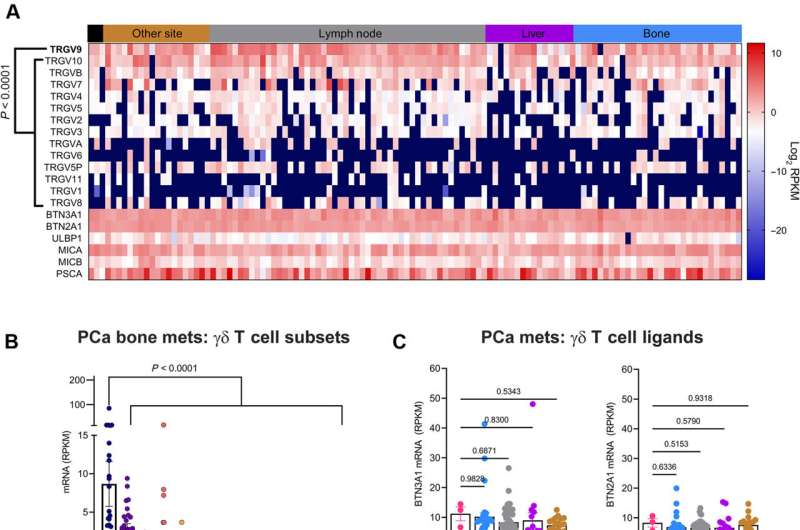This article has been reviewed according to Science X's editorial process and policies. Editors have highlighted the following attributes while ensuring the content's credibility:
fact-checked
peer-reviewed publication
trusted source
proofread
Researchers develop CAR T cells that fight prostate cancer in bone

Prostate cancer frequently metastasizes to the bone and is incurable. Moffitt Cancer Center researchers are working to identify new treatment options for this subset of patients. In a new article published today in Science Advances, a team of Moffitt scientists demonstrates that chimeric antigen receptor T-cell (CAR T) therapy is an effective antitumor approach in mouse models of bone metastatic prostate cancer.
"Bone metastatic prostate cancer is an incurable disease that significantly impacts patient lives through extreme bone pain," said study co-lead author Conor Lynch, Ph.D., interim chair of the Tumor Biology Department at Moffitt. "Bisphosphonates such as zoledronate help mitigate this problem and reduce pathological fracture but have little impact on patient survival. Therefore, new treatment options are urgently needed."
Moffitt researchers wanted to investigate the possibility of using CAR T-cell therapy for bone metastatic prostate cancer and whether this treatment approach could be enhanced by combining it with zoledronate. CAR T therapy is relatively new in cancer treatment. This form of cellular immunotherapy was first approved in 2017 for certain blood cancers. For this therapy, T cells isolated from patients are genetically engineered to target a tumor-specific marker. The T cells are expanded in culture and infused back into the patient where they can target tumor cells for destruction.
In this collaborative study between the labs of Lynch and Daniel Abate-Daga, Ph.D., co-first authors Jeremy Frieling, Ph.D., and Leticia Tordesillas, Ph.D., used a specific subtype of T cell called gamma/delta T cells.
"These are relatively less studied than the conventional alpha/beta T cells but have attracted substantial interest from the biotech sector in recent years," said co-lead author Abate-Daga, associate member of the Department of Immunology and scientific director of the Cell Therapies Core Facility at Moffitt.
The researchers created CAR T cells that were specific to the tumor biomarker called prostate stem cell antigen (PSCA) that is highly expressed in bone metastatic prostate cancer. They demonstrated that the CAR T cells killed prostate cancer cells in cell culture and stimulated the production of chemical messengers that stimulate immune cell activity.
They next moved their experiment to mouse models and showed that the CAR T cells significantly decreased the size of tumors and improved survival with limited toxicity. Additionally, pretreatment of the mice with zoledronate helped activate the CAR T cells through a CAR-independent mechanism, allowing for increased ability to recognize and destroy tumors. Importantly, in addition to eliminating tumors, this treatment was able to preserve the health of the bones.
"To our knowledge, this study is the first to evaluate gamma/delta T cells for expressing chimeric antigen receptor and treating bone metastatic prostate cancer. This strategy offers a dual-targeting mechanism to eradicate bone metastatic prostate cancer, a strategy that can be quickly translated to the clinical setting," Abate-Daga said.
More information: Jeremy S. Frieling et al, γδ-Enriched CAR-T cell therapy for bone metastatic castrate-resistant prostate cancer, Science Advances (2023). DOI: 10.1126/sciadv.adf0108
















